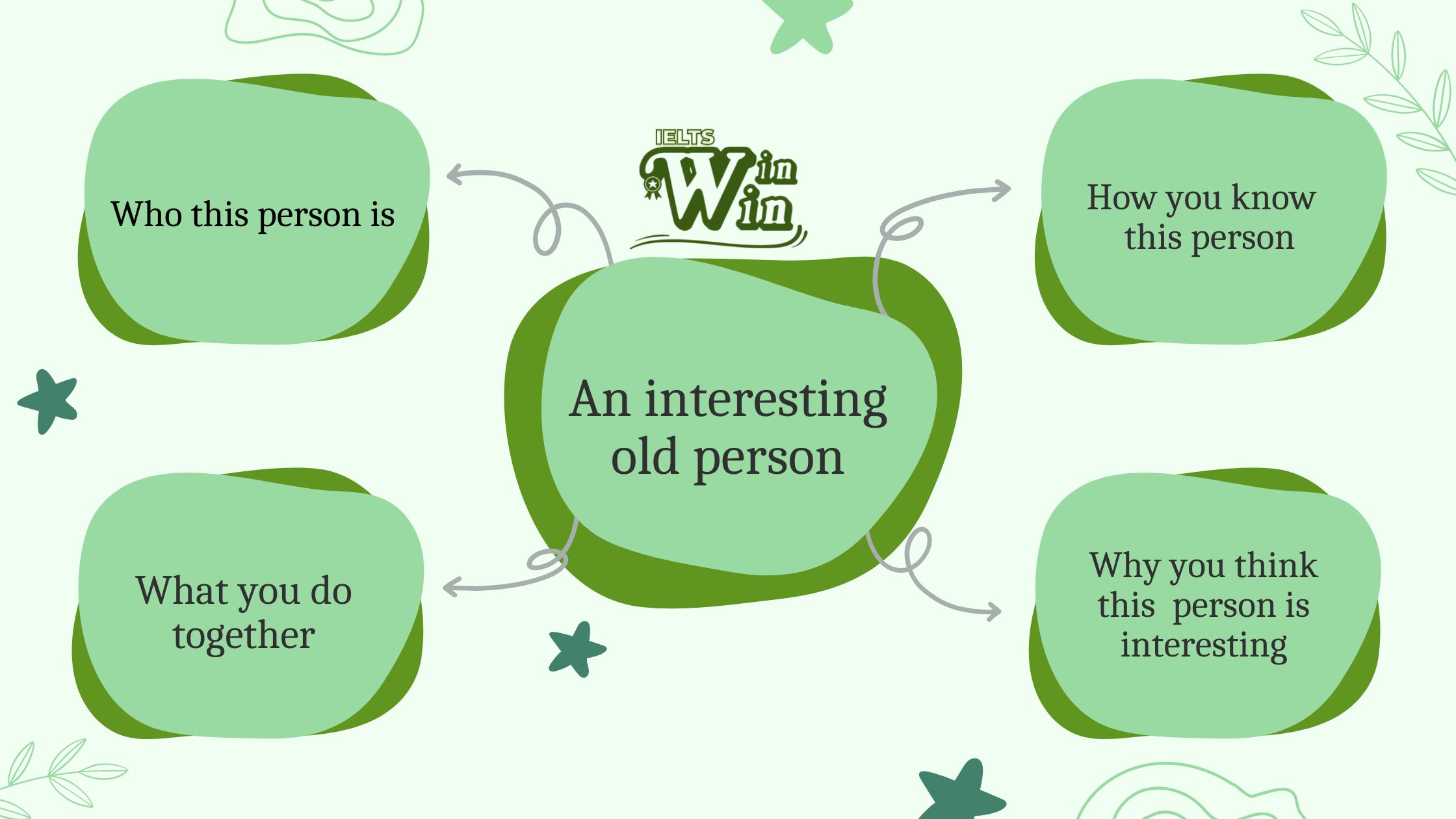✨Describe an interesting old person you know.
You should say:
- who this person is
- how you know this person
- what you do together and explain
- why you think this person is interesting.
Who: The first person who comes to mind is Mr. O'Connell, my former English teacher during my studies in Australia.
How/ What: In 2019, when I first arrived in Australia, I had to take a 3-month English class before attending public high school. Mr. O'Connell was the head teacher and gave me a warm welcome to the class. My first impression of him was that he looked like the headmaster in the Harry Potter series, with a long white beard but unfortunately, not long white hair. He was the first teacher I had ever seen who was so devoted to his job. Despite his old age, he took us international students around the city, showed us around, and taught us common English words used in Australia. He was also an excellent writing teacher, correcting and recommending grammatical structures and examples that would be helpful in my essays. I truly appreciated his guidance, and thanks to him, I passed my entrance English exam with flying colours to get into high school. Mr. O'Connell even wrote a recommendation letter for me to get into the top class in high school.
Why: Whenever I attended Mr. O'Connell's class, I felt a sense of excitement as he radiated positivity throughout the room. He gave me a sense of family bonding, which I needed most when I was an 8-hour flight far from home. Even though I only studied with him for 3 months, I was fortunate enough to see him every day after that period as the English centre was located on the high school campus. I usually went there to seek his advice and watch some movies during breaks. I will always be grateful for having such an inspiring and dedicated teacher in my academic life.
- Devoted /dɪˈvoʊtɪd/: (adj.) tận tụy, tận tâm, kiên trì, tận tuỵ.
- Passed something with flying colors /pæst sʌmθɪŋ wɪð ˈflaɪɪŋ ˈkʌlərz/: vượt qua một thử thách hoặc kỳ thi một cách dễ dàng và thành công.
- Radiated /ˈreɪdiˌeɪtɪd/: (v.) tỏa ra, tỏa sáng, phát ra.
- Campus /ˈkæmpəs/: (n.) khuôn viên trường học, đại học.
- Dedicated /ˈdɛdəˌkeɪtɪd/: (adj.) tận tụy, cống hiến, dành riêng, đặc biệt.
PART 3
✨What are the advantages of having an elderly person at home?
There are several advantages to having an elderly person at home, namely the sharing of experience, companionship, and good role modelling. Firstly, elderly individuals have a wealth of knowledge as they have gone through challenges in life, and can offer younger family members valuable advice and guidance. Secondly, having an elderly person at home can provide trustworthy companionship, with someone to listen to and support other family members during difficult times. Lastly, an elderly person who is recognized for their positive values can serve as a good role model for younger family members to follow.
- Companionship /kəmˈpænjənʃɪp/: (n.) sự đồng hành, sự bạn đồng hành.
- A wealth of something /ə wɛlθ ʌv/: (phrase) nghĩa là một số lượng lớn, phong phú hoặc đa dạng của cái gì đó.
- Trustworthy /ˈtrʌstˌwɜrði/: (adj.) đáng tin cậy, có thể tin tưởng.
✨Is there anything that older people should learn from the younger generation?
There are several areas in which the older generation can learn from the younger generation. The world is constantly changing, and younger people are often more adaptable to these changes. One area in which older people can benefit from the younger generation is technology. Younger people are generally more proficient at using new technology and can help elderly people learn how to use devices such as smartphones or tablets to connect with others. Additionally, younger people often have new perspectives and life experiences that can offer valuable insights and broaden the minds of the elderly. This is especially important for older people who may be accustomed to thinking about things in a certain manner.
- Adaptable /əˈdæptəbəl/: (adj.) có thể thích nghi, có thể thích ứng.
- Perspectives /pərˈspɛktɪvz/: (n.) quan điểm, góc nhìn, triển vọng.
- Broaden the minds /ˈbrɔdn ðə maɪndz/: (phrase) mở rộng tầm nhìn, mở mang kiến thức.
- Accustomed /əˈkʌstəmd/: (adj.) quen với, đã quen thuộc với.
✨What can the younger generation learn from the older generation?
The older generation has accumulated wisdom and valuable life experience, having gone through more of life's ups and downs. They can pass on their knowledge to younger generations, helping them navigate through their own challenges. Advice on personal or life situations can guide younger people to make informed decisions and avoid making mistakes. Furthermore, older individuals often have a strong connection to their cultural heritage, which can help younger family members appreciate and understand traditions, customs, and values that have been passed down through generations.
- Accumulated /əˈkjumjəˌleɪtɪd/: (v.) tích lũy, chất đống.
- Navigate /ˈnævəˌɡeɪt/: (v.) định hướng, điều khiển, điều hướng.
- Heritage /ˈhɛrətɪdʒ/: (n.) di sản, di sản văn hóa.
✨What qualities does a person need to take care of old people?
Patience is of paramount importance for caregivers. The elderly usually encounter difficulties when doing a task or communicating, which takes them more time to complete. Therefore, caregivers must be patient with them. Compassion is also crucial in understanding and responding to the emotional needs of the elderly. They should be gently comforted, reassured, or listened to regarding their concerns. Being physically healthy is also helpful in this kind of job, where lifting or transferring wheelchairs of elderly people requires a lot of physical strength.
- Caregivers /ˈkerˌɡɪvərz/: (n.) người chăm sóc, người giữ trẻ.
- Compassion /kəmˈpæʃən/: (n.) lòng trắc ẩn, lòng trắc ẩn thông cảm.
- Reassured /ˌriəˈʃʊrd/: (v.) đảm bảo, làm cho yên tâm, an tâm.
✨Do you think elderly people should be allowed to work?
As long as they’re capable of the work that they are responsible for, then why not? Having a job and earning salaries in old age could potentially reduce their reliance on familial assistance and prevent them from becoming a burden to their loved ones. In addition, old workers have more vocational experience so the need for extensive training is eliminated, thereby reducing significant costs for employers. Lastly, being able to work gives them a sense of community engagement, making them feel less lonely when their kids are out working.
- Reliance /rɪˈlaɪəns/: (n.) sự phụ thuộc, sự tin tưởng vào ai/cái gì đó.
- Vocational /voʊˈkeɪʃənəl/: (adj.) thuộc nghề nghiệp, liên quan đến nghề nghiệp.
Xem thêm các bài viết về Speaking Part 2 và 3 ở đây bạn nhé
Đừng ngần ngại để lại thông tin hoặc liên hệ với chúng mình qua địa chỉ sau đây để IELTS WinWin có thể hỗ trợ tốt nhất cho bạn nhé!
Địa chỉ: 118 Nguyễn Xuân Khoát, P. Tân Thành, Q. Tân Phú, TP. Hồ Chí Minh.
Fanpage: IELTS WinWin
Zalo: 0965 439 239 – 085 301 8788
Website: ieltswinwin.com



